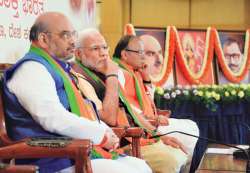Union Budget 2018: Why this budget means a lot for Modi Govt ahead of 8 assembly polls and 2019 Lok Sabha elections
This will be the last full-fledged budget by the Modi government ahead of the 2019 Lok Sabha elections, and the first after the implementation of the Goods and Services Tax (GST).

The stage is set for Finance Minister Arun Jaitley to unveil on Thursday Union Budget 2018 – the last full-fledged budget by the Modi government ahead of the 2019 Lok Sabha elections, and the first after the implementation of the Goods and Services Tax (GST).
This budget means a lot for the NDA government as it not only comes ahead of the 2019 General elections, but also in a year when eight state assemblies – Meghalaya, Tripura, Mizoram, Nagaland, Karnataka, Madhya Pradesh, Chhattisgarh and Rajasthan – go to polls.
It also holds importance in the backdrop of the recently-concluded Gujarat Assembly elections, which saw the BJP lagging in rural areas that are battling falling farm incomes and dearth of jobs.
Reeling under the aftermath of structural economic reforms such as the GST and demonetisation, the economy is expected to grow at 6.75 per cent in 2017-18 – slowest in three years.
Also Read: Union Budget 2018-19 LIVE Streaming: When and where you can watch FM Jaitley's speech on Feb 1
However, the Economic Survey 2018 said that the economy has recovered from the short-term effects of GST and note ban, and pegged the country's growth at 6.75 per cent for the current fiscal and 7 to 7.5 per cent for 2018-19.
Expectations and predictions are already at full pace, as Prime Minister Narendra Modi has already said that the upcoming budget will fulfil everyone’s dreams.
“The budget will add new vigour to India’s development and will fulfil aspirations of people,” he said ahead of the start of Budget Session.
While PM Modi has time and again said that the Budget 2018 will not be a ‘populist’ one, experts believe that it will be an attempt by the government to appease the common man.
The budget needs to include solutions for vexed problems such as rural distress, weak employment and revival of private investments, which have the potential to harm the saffron party’s electoral prospects.
Also Read: Union Budget 2018: From tax rebate to safeguarding women’s interests, here’s what the nation expects from Arun Jaitley
On top among the expectations is a hike in the personal tax exemption limit and tweak in the tax slabs. According to government sources, the proposals before the finance ministry is to hike the tax exemption limit from the existing Rs 2.5 lakh per annum to at least Rs 3 lakh.
The government could also lower tax rate by 10 per cent on income between 5-10 lakh, levy 20 per cent rate for income between Rs 10-20 lakh and 30 per cent for income beyond Rs 20 lakh.
The Economic Survey has indicated that agriculture sector and job creation will top the government’s agendas in the much-awaited Budget.
This can also be expected because farm distress due to low prices of agriculture produce affected BJP’s performance in rural regions in the Gujarat elections.
According to Central Statistics Office data, the expansion in activities in 'agriculture, forestry and fishing' is likely to slow to 2.1 per cent in the current fiscal year from 4.9 per cent in the preceding year. Many analysts expect the government to announce measures to improve farm sector productivity and income.
Meanwhile, job creation is another concern that has added to the Modi government’s woes as the Opposition has been raising the issue time and again to corner the Centre.
Experts believe that a National Employment Policy (NEP) will be introduced in the Budget, which will outline a comprehensive road map for creation of quality jobs across sectors through economic, social and labour policy.
The massive push to the infrastructure sector – which has been through all four budgets – is likely to continue this time as well.
As this is going to be the last full-fledged Budget of the government before the 2019 general elections, investment in infrastructure sector is going to serve a dual purpose – development and job creation.
There are at least 10 big infrastructure projects in the pipeline including Rs 12 lakh crore Sagarmala project and Rs 14,000 crore Bharatmala project. Moreover, the ambitious Bullet Train project will need at least Rs 1.1 lakh crore of investment during the 2017-22 period.
Meanwhile, the government is also pegging Rs 20 lakh crore investment plan for high-speed corridors and other projects for the modernisation.
On the other hand, the realty sector – severely impacted by various reforms such as RERA, GST and demonetisation – is pinning its hopes for relief measures like lower taxes and infrastructure status.
The Economic Survey, which was tabled on Monday, called for a pause in fiscal consolidation, leading to concerns that the government could widen its fiscal deficit targets for 2018-19.
Structural economic reforms such as demonetization and GST have slowed the economy and squeezed revenue receipts, resulting in rising fiscal pressures. The government might not meet the fiscal deficit target of this year. It is, however, targeting to curb the fiscal deficit to 3.2 per cent of the GDP.
The target Jaitley had previously set out was to lower the fiscal deficit to 3.2 per cent of the GDP in the current fiscal and to 3 per cent in 2018-19, the Budget for which he would present in the Lok Sabha tomorrow.
All said and done, if the Economic Survey is anything to go by, the government is ready to woo the common man with its budget, keeping the 2019 general elections in mind.